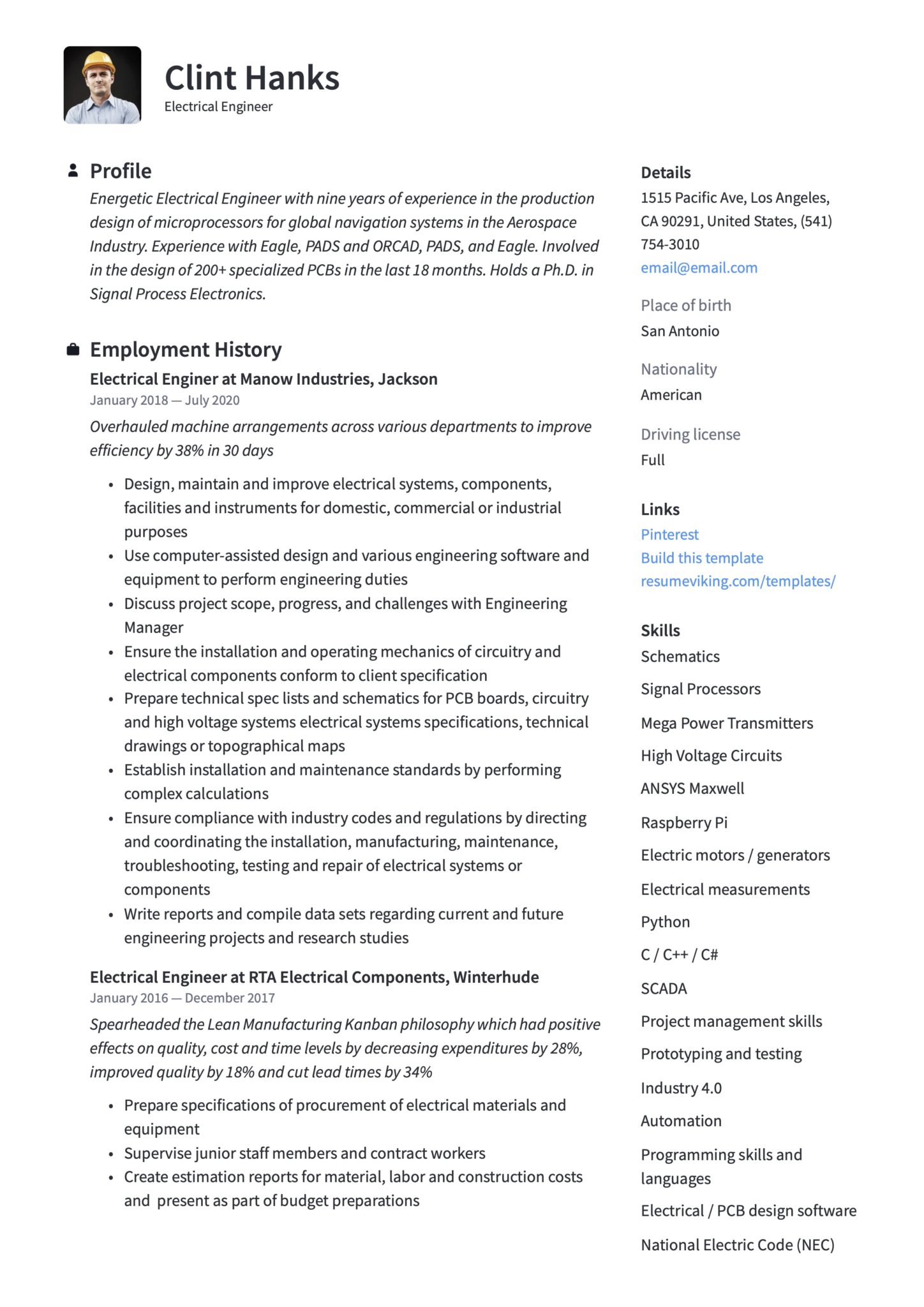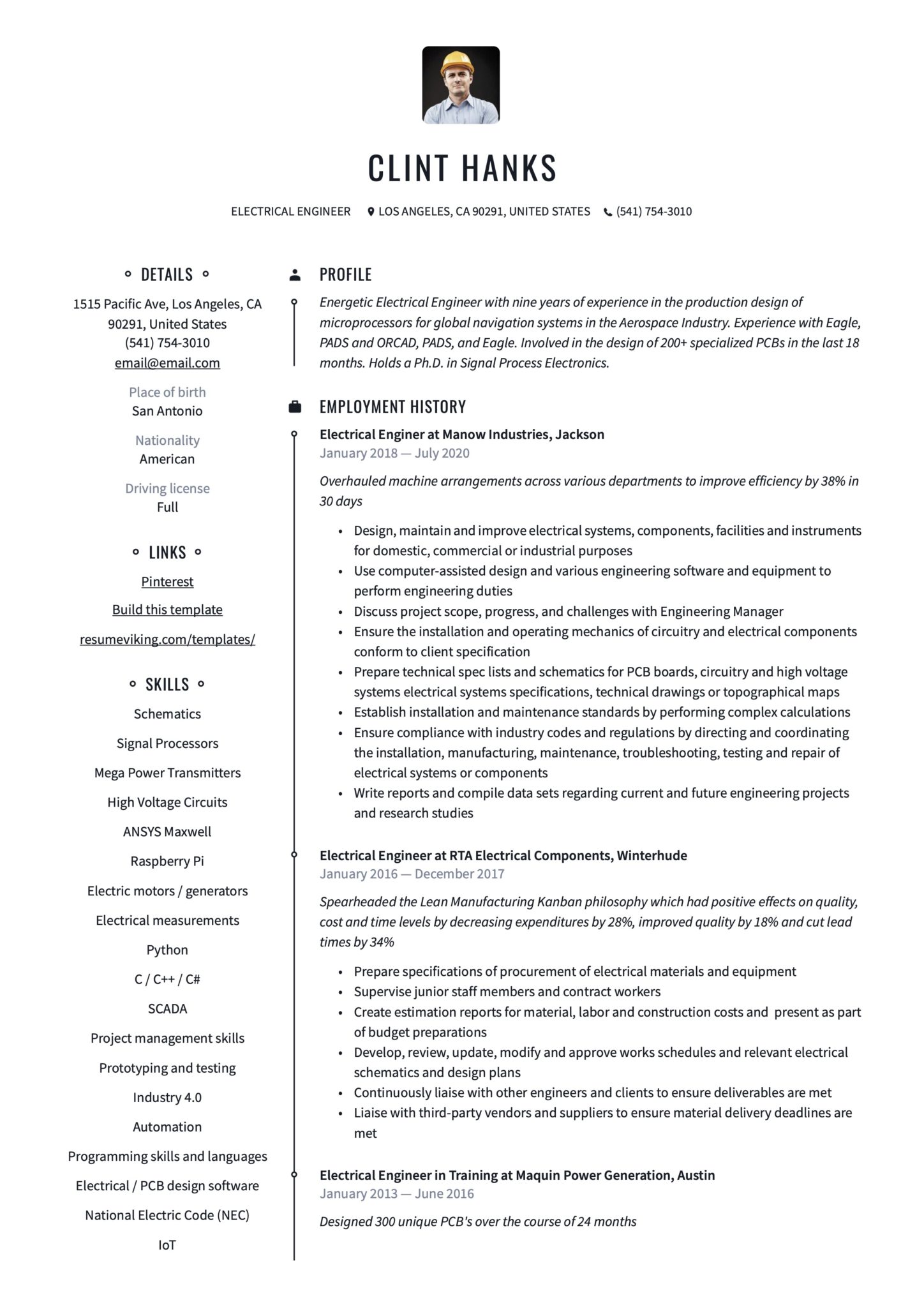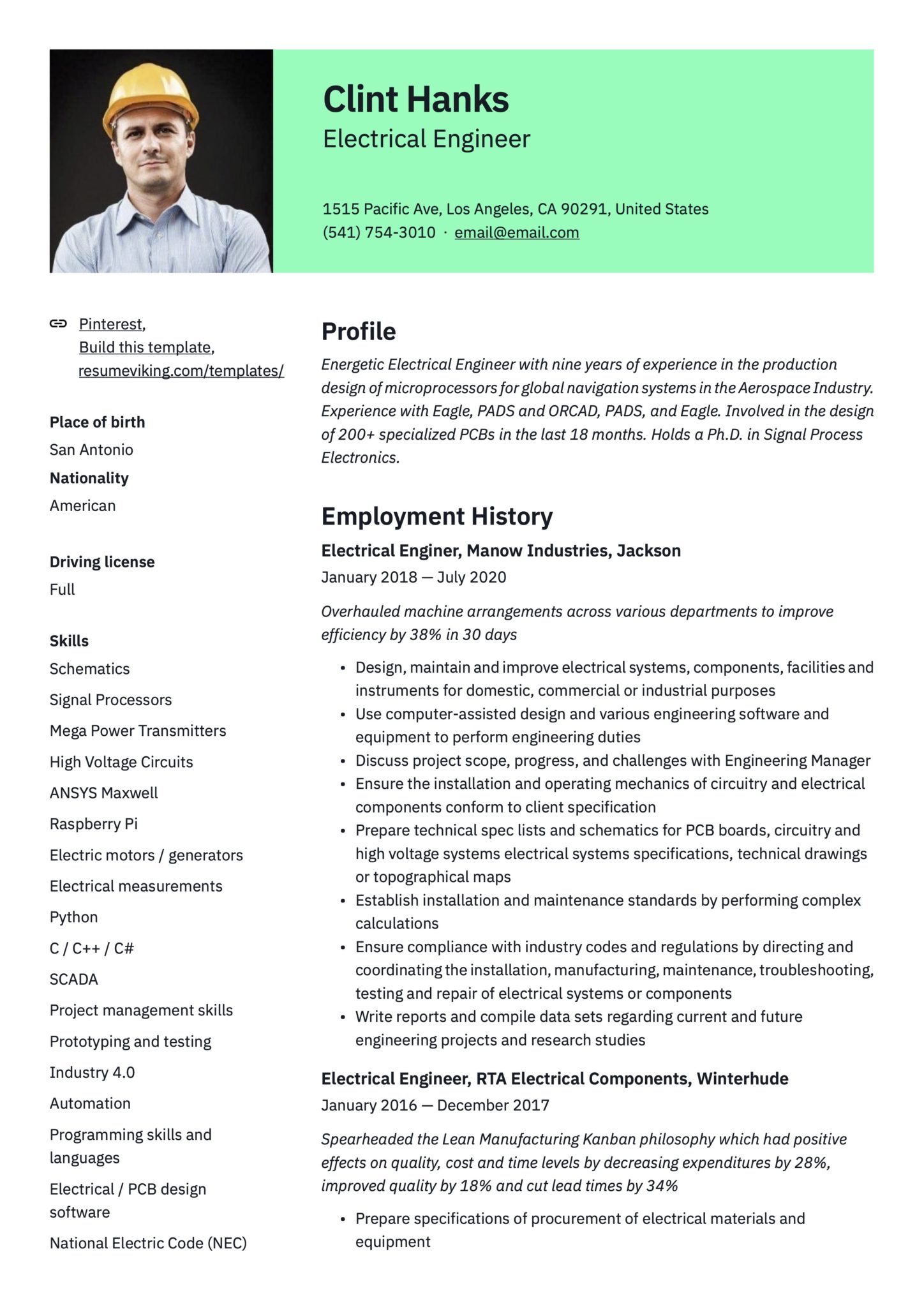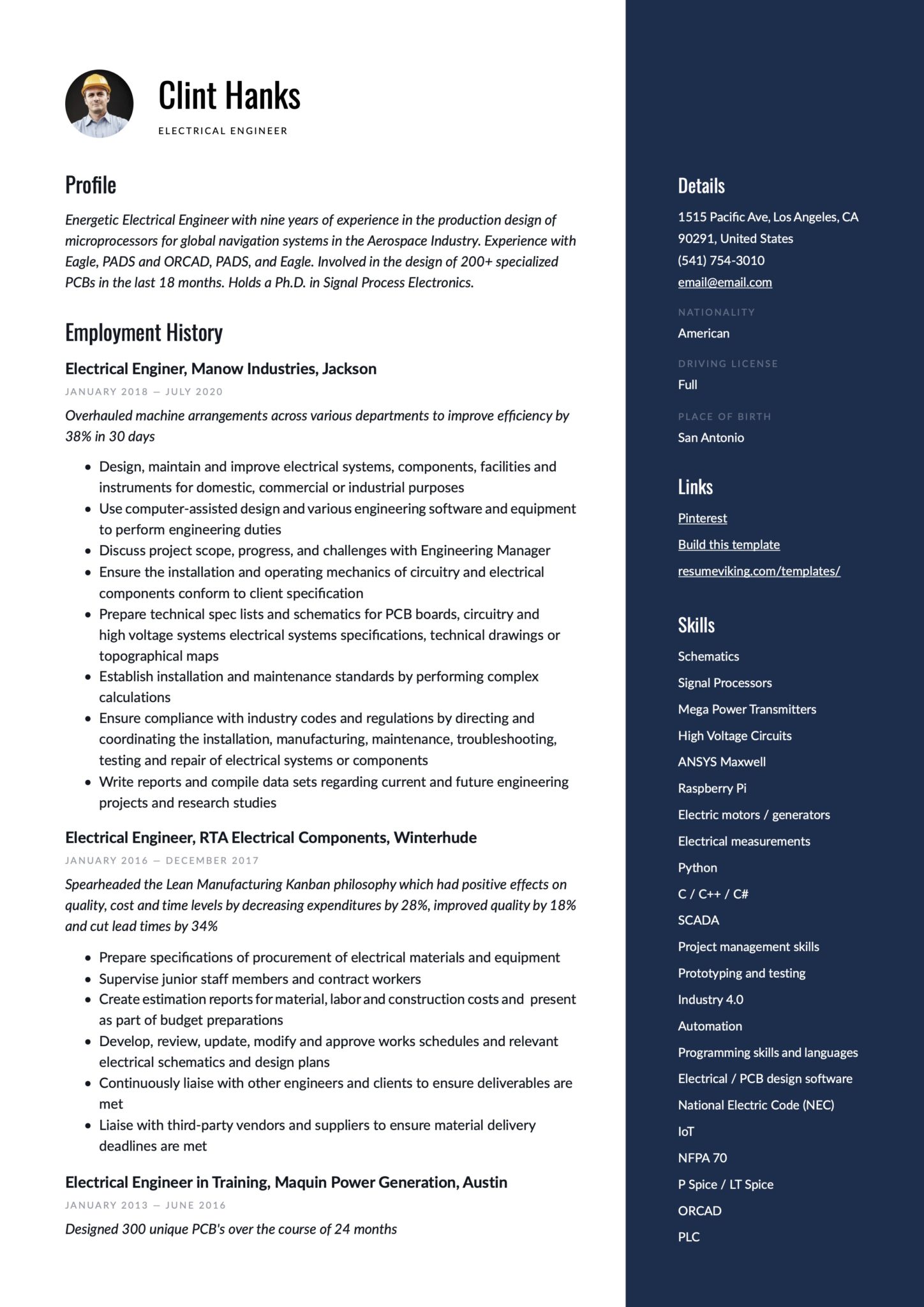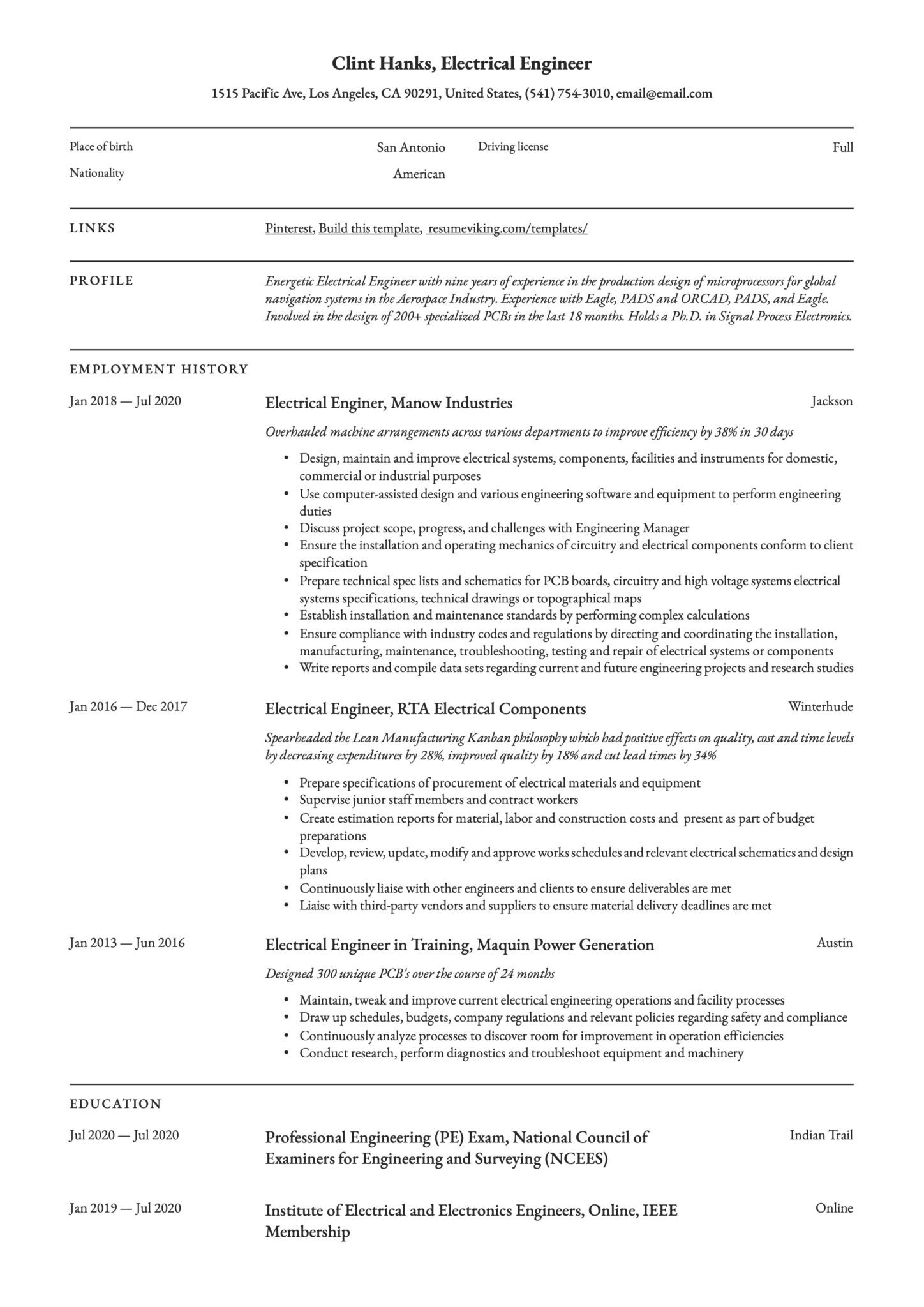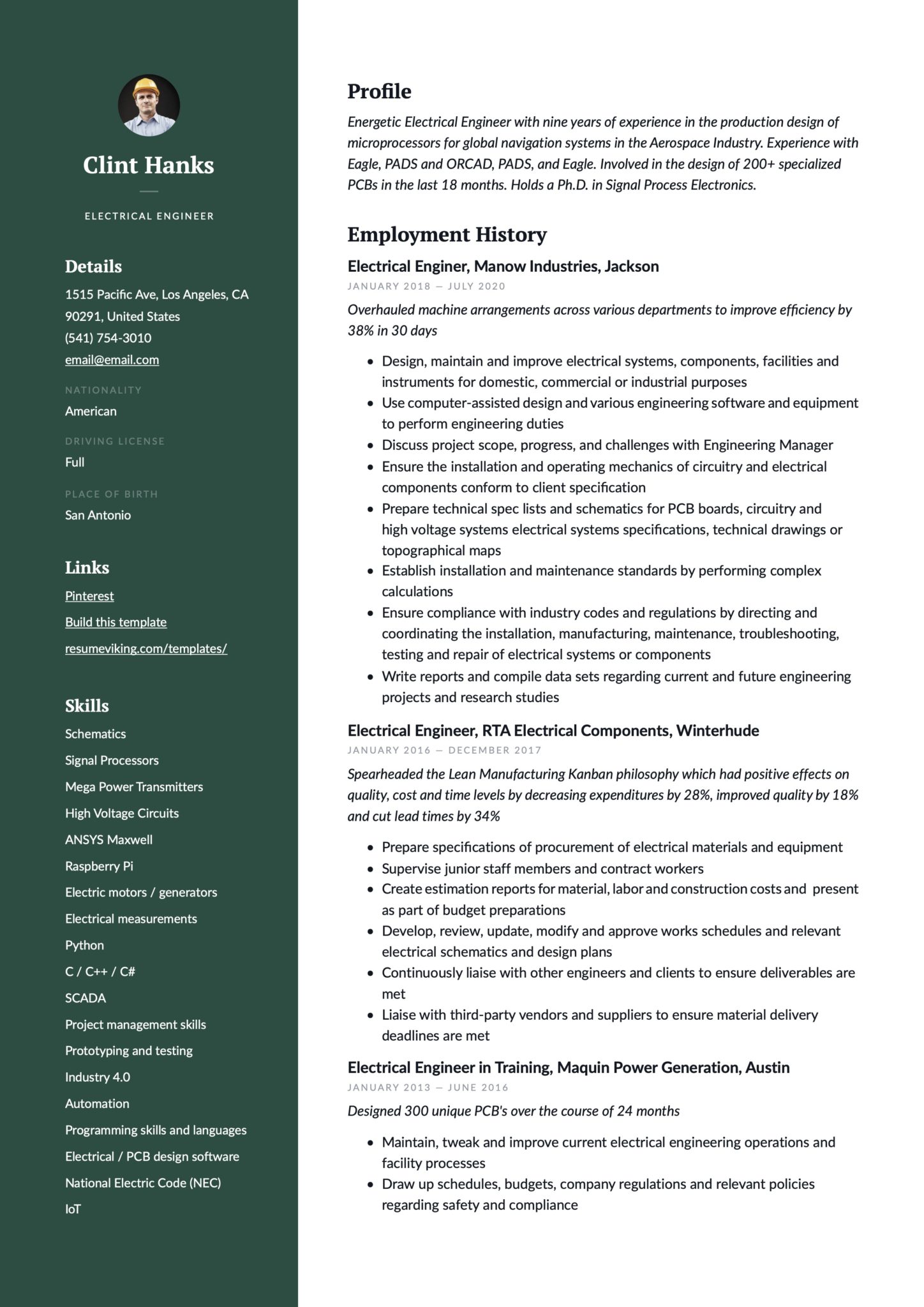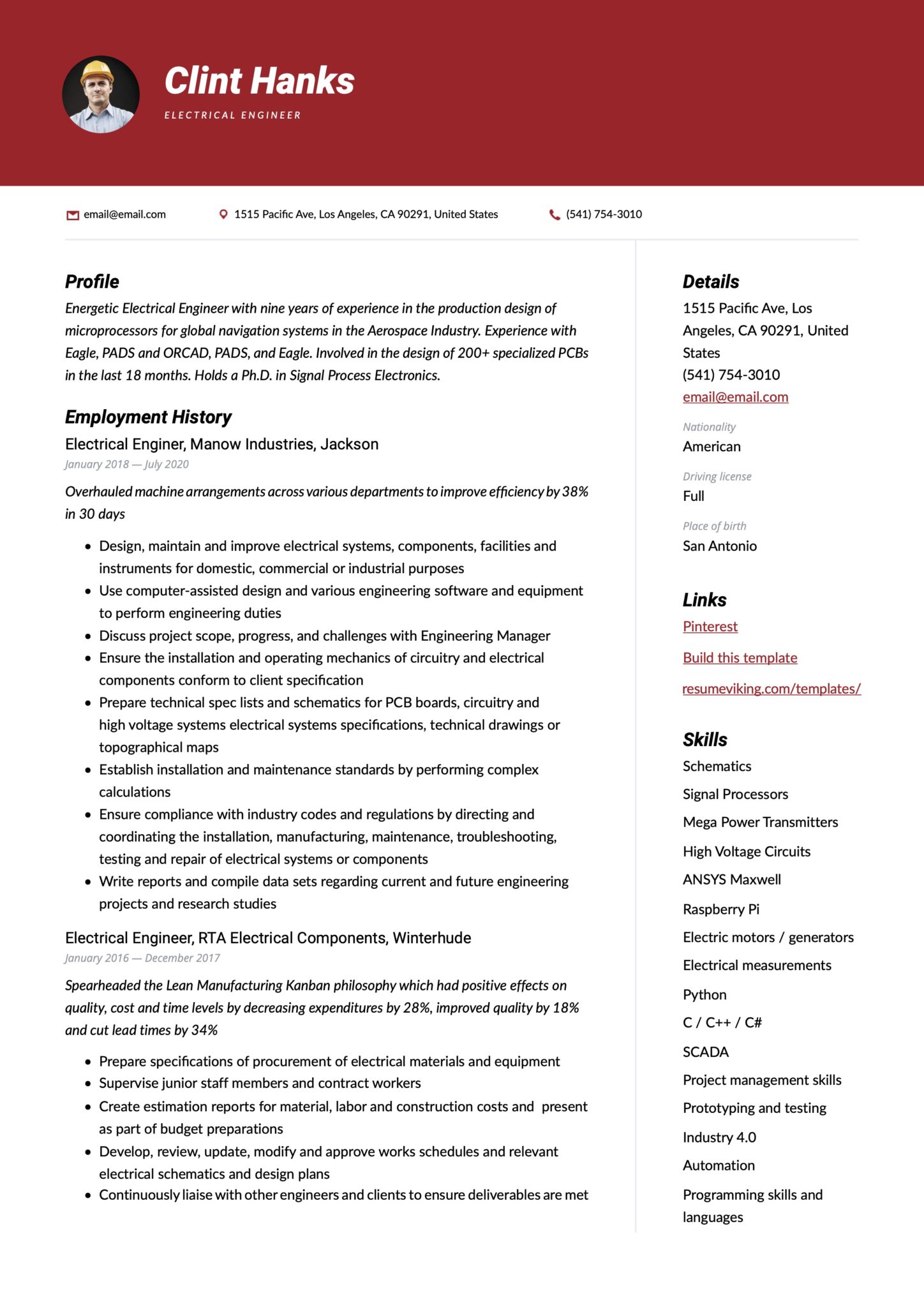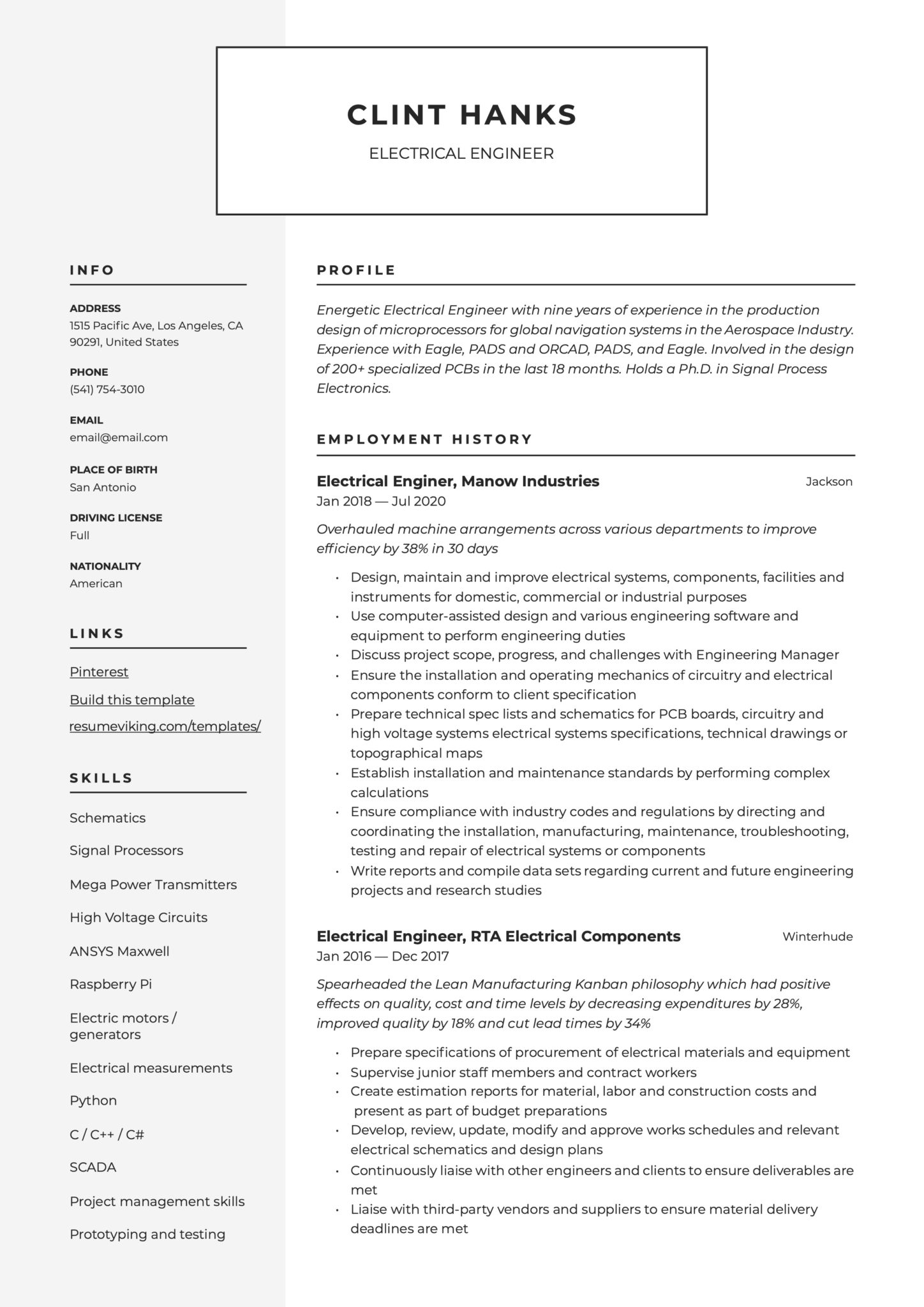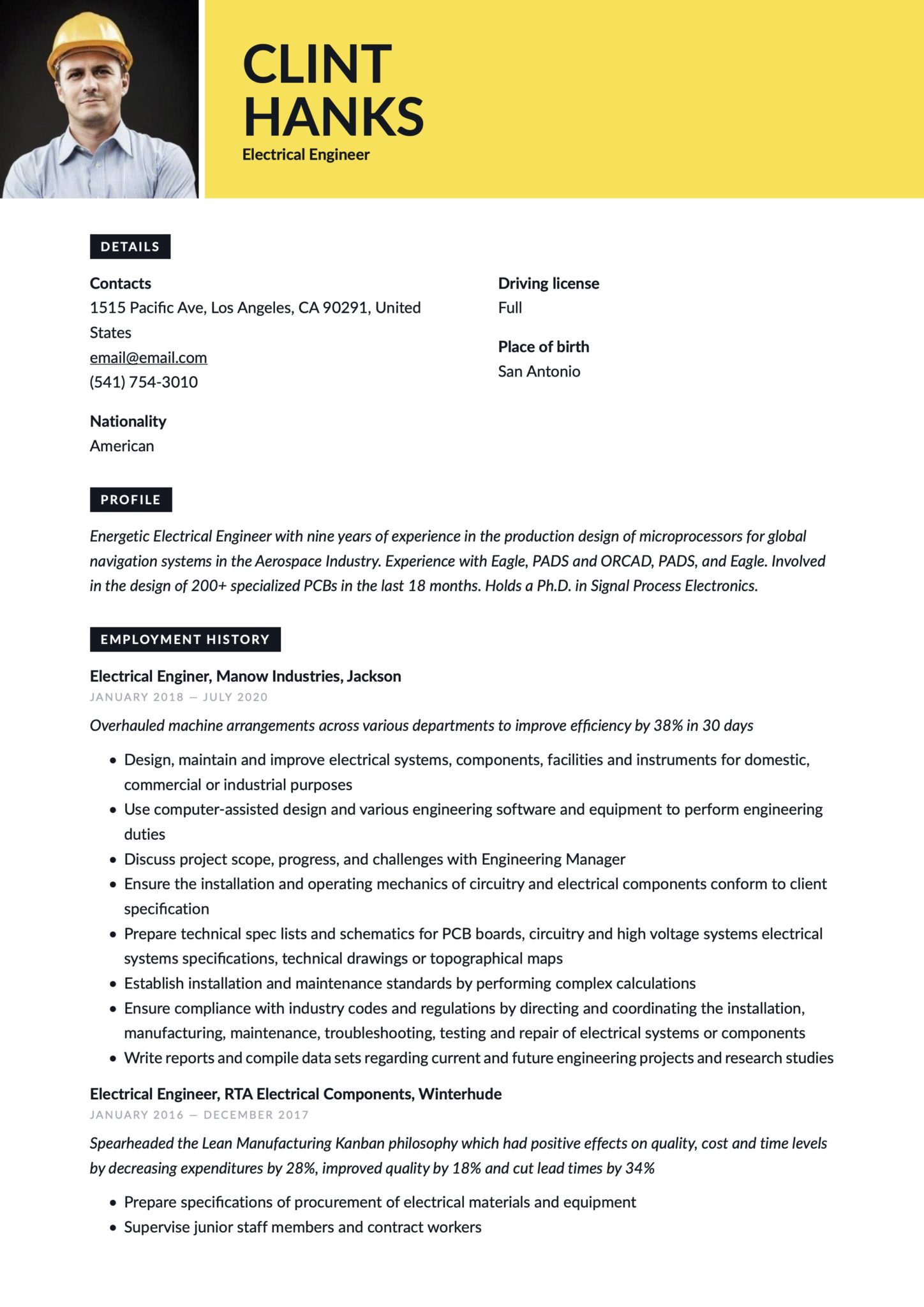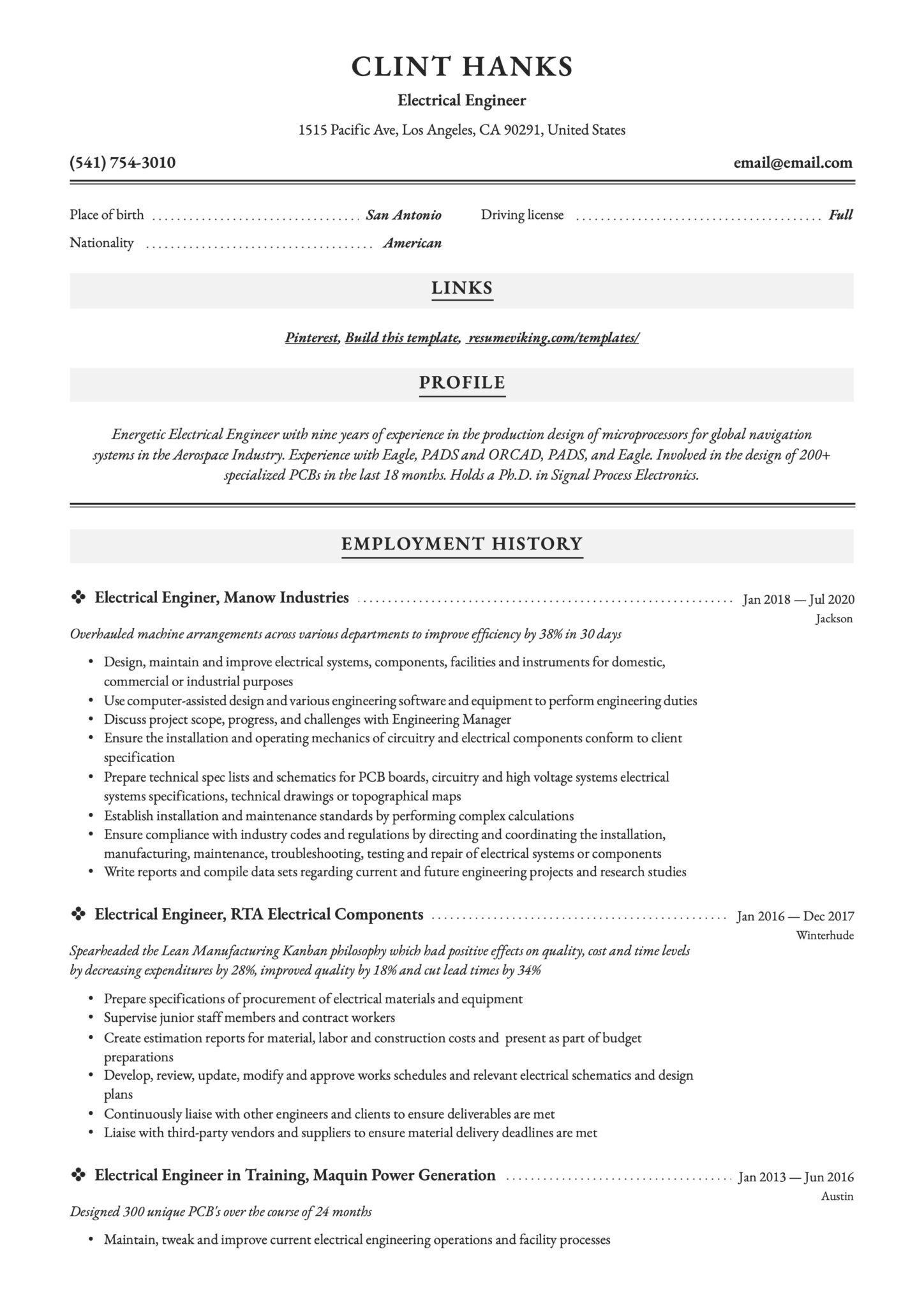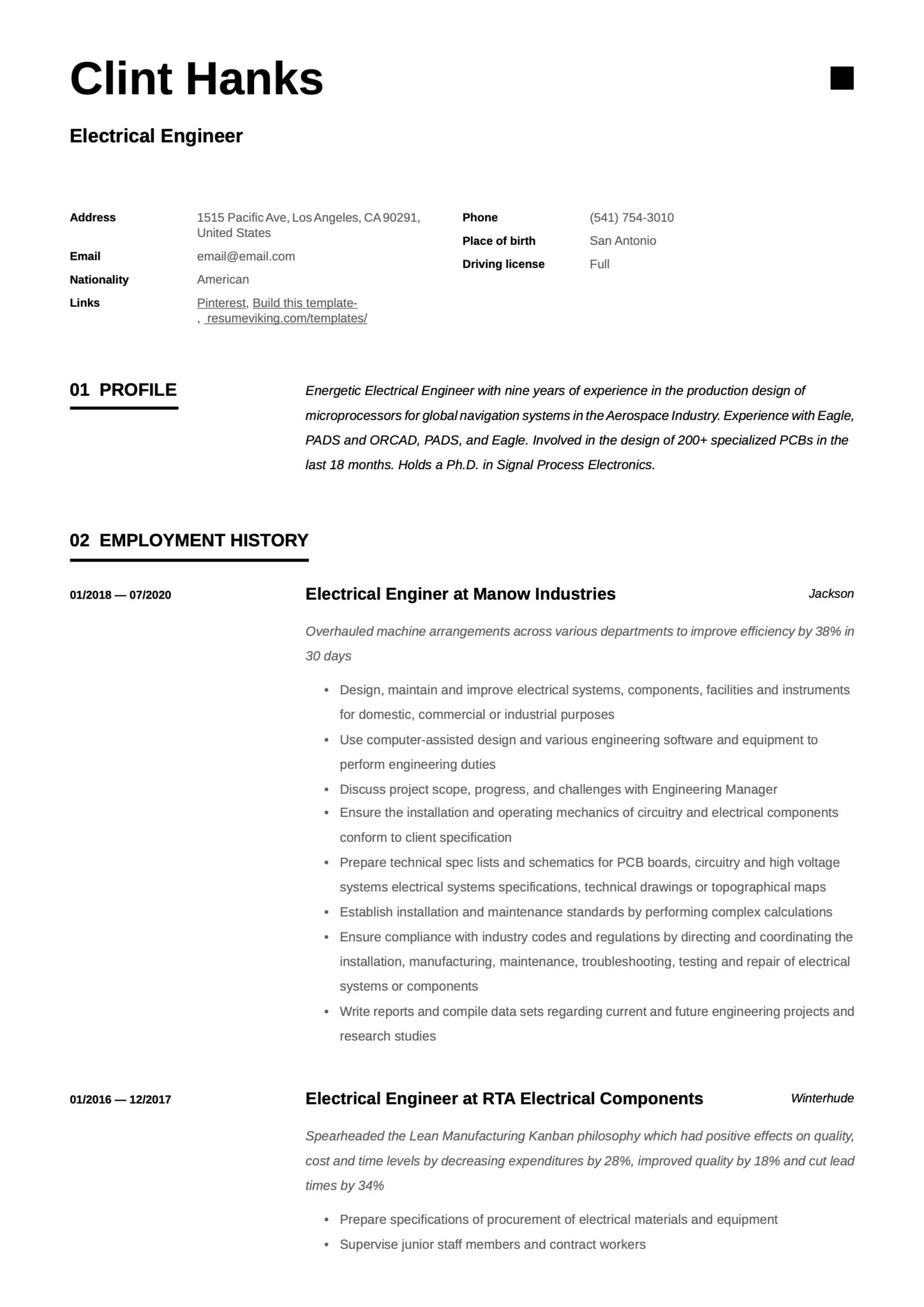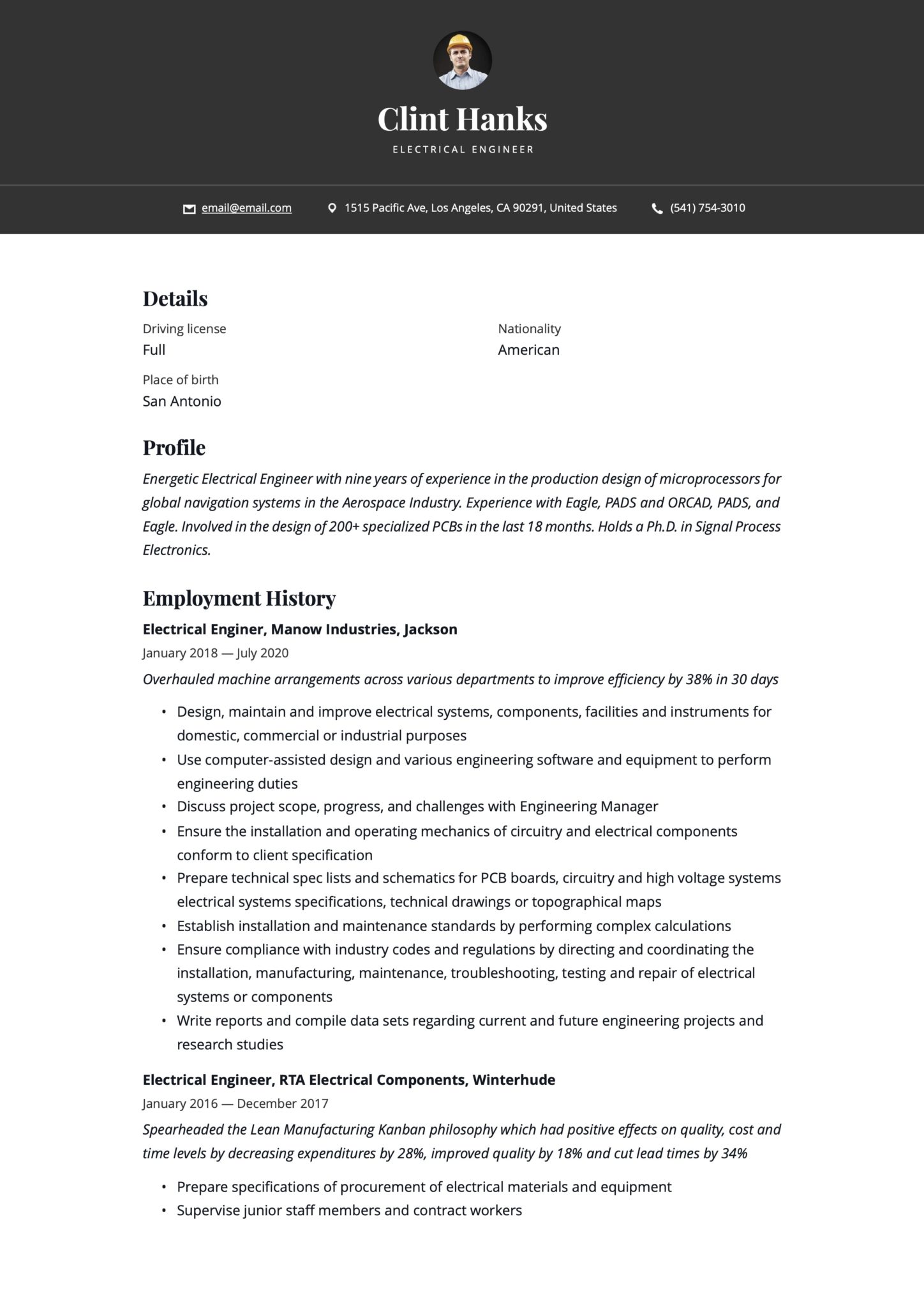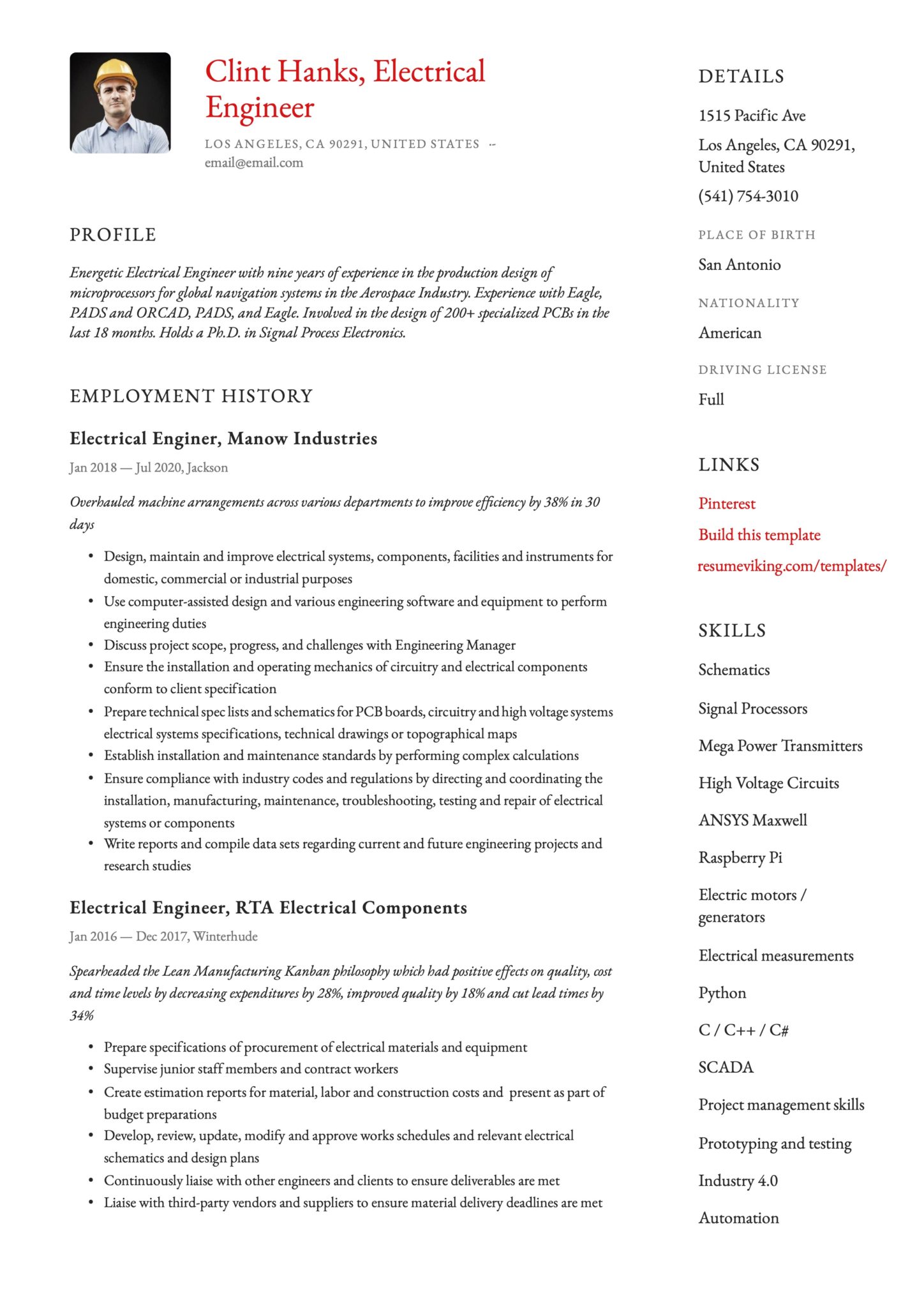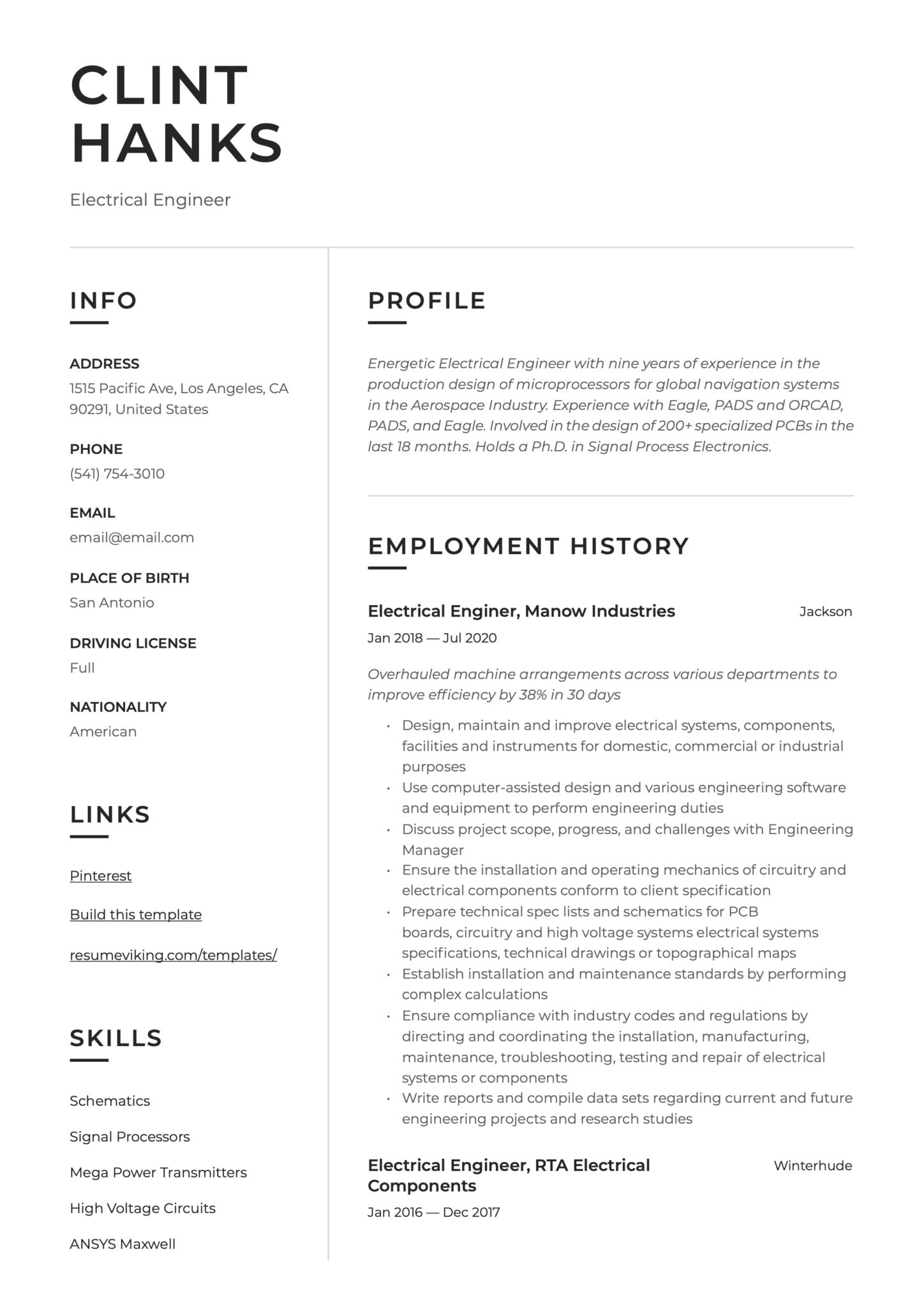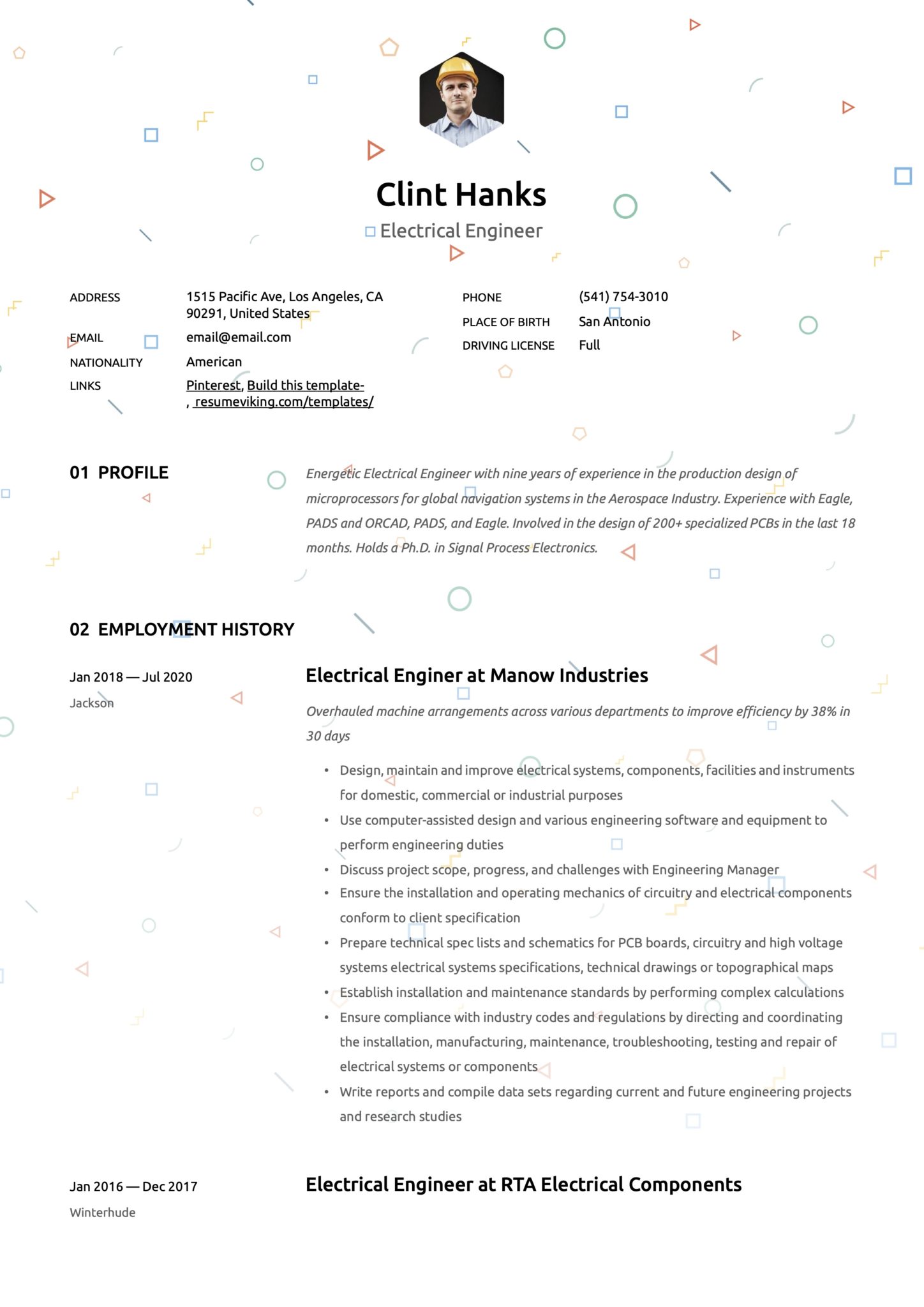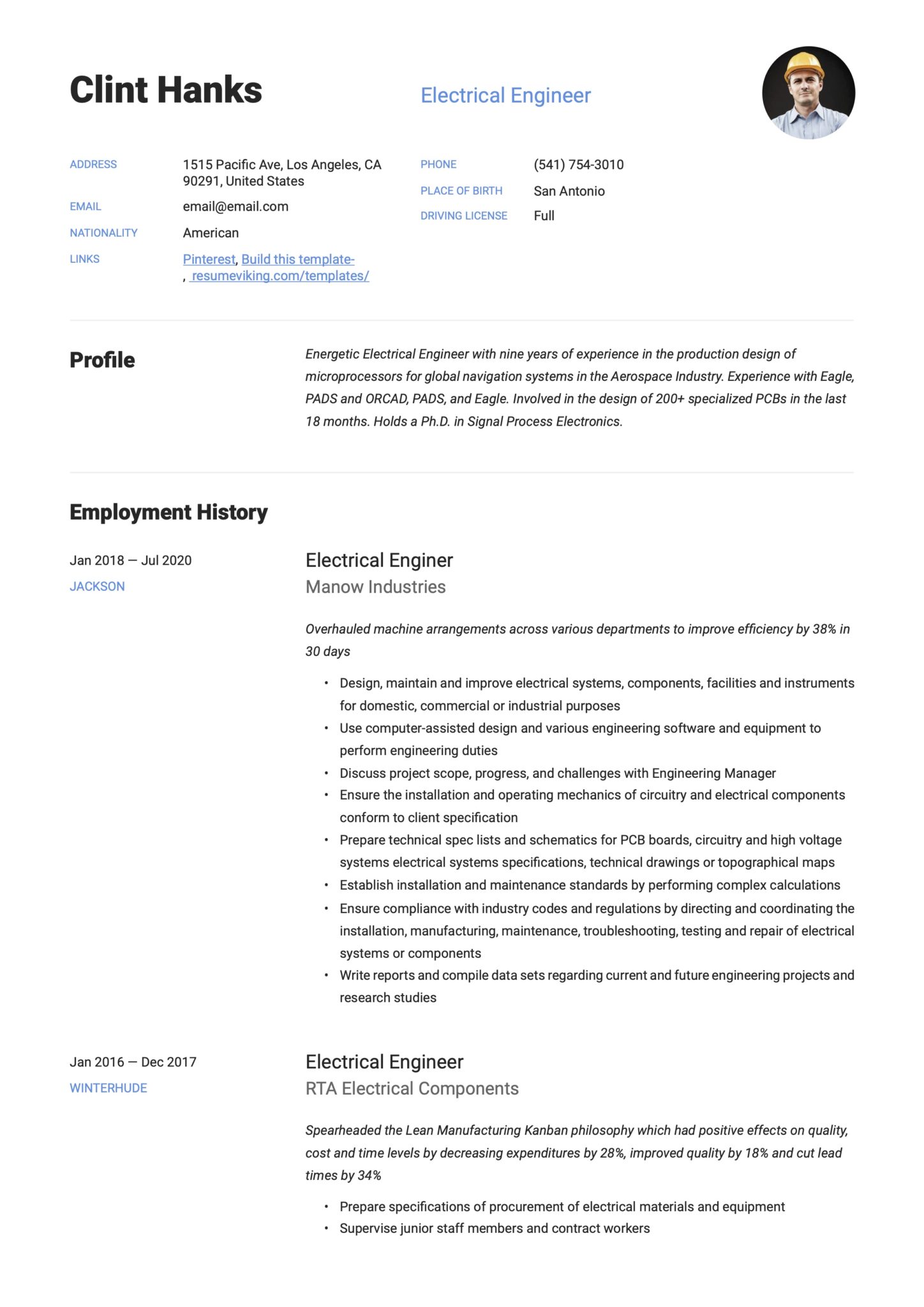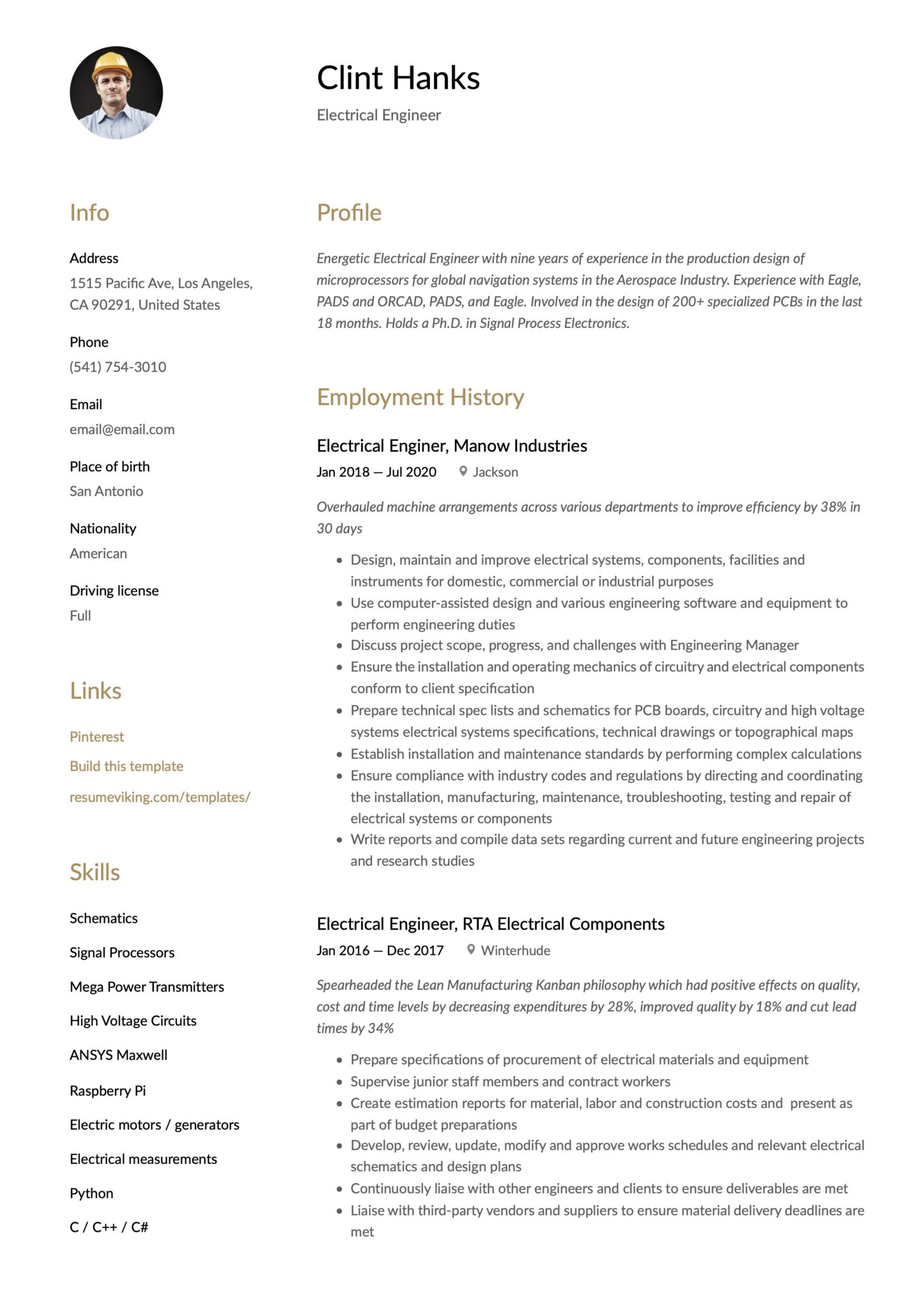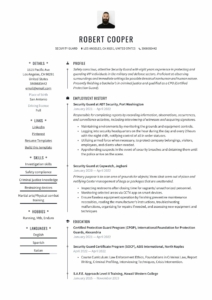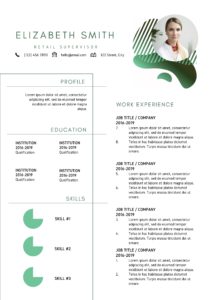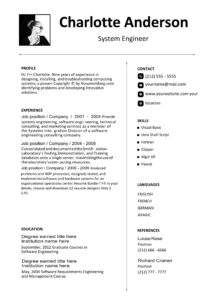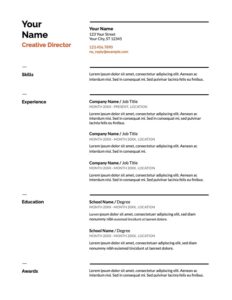Are you looking for your next Electrical Engineering challenge? As the first step in your job seeking journey, why not review our Electrical Engineer resume sample below. As an electrical engineer, you would be tasked with developing electrical systems, troubleshooting issues, and testing equipment. That's your purpose in a nutshell. However, most candidates applying for Electrical Engineering jobs find it challenging to balance resume information and resume length, either writing a 10-page career recollection or omitting vital information relevant to the role.
This is where we can help you craft an Electrical Engineering Resume that is on par with industry standards and appeals to both a technical (Engineering Manager) or non-technical (HR Manager) hiring fraternity.
In this Electrical Engineering Resume Guideline, you will learn how to piece together the content of your resume to create a noteworthy application, instantaneously catching the attention of hiring managers.
What you can read in this article
Electrical Engineer Resume Examples
(Free sample downloads are at the bottom of this page)
Electrical Engineer Resume Writing Guide
Resume Sections
1. Contact Information:
- First Name
- Last Name
- Cell Number
- Current Location
Feel free to include your LinkedIn profile or Instagram handle URL for a more personal touch. Remember to use a professional email address and verify the digits of your contact details before hitting the send button.
2. Career Summary:
Also referred to as a career synopsis, this paragraph can be viewed similar to a design specification overview. Provide 4-6 sentences highlighting your most noteworthy “specs,” for example, career tenure, industry experience, specialist skills, and highest qualifications.
3. Qualifications:
For education, you may think to add only your Bachelors's/Masters Degrees correct? Not so, your education section should be a comprehensive display of formal degrees, certifications, workshops, short courses, and Continuous Professional Development (CPD) activities. Basically, an overview of all your theoretical, practical, and technical credentials. Start with the basics: completion date, qualification name, institution attended. Then beef it up with GPA scores, course curriculums, significant subjects, academic accolades, hours accumulated, and so forth. Also, remember to add the qualifications, certifications, or licensing exams that you are currently in the process of completing and include the estimated end date.
4. Relevant Electrical Engineering Experience:
It is a bit tricky to balance quantity and relevance when describing your experience as an electrical engineer. Always ask yourself what is most pertinent to the job advertisement requirements when listing your work duties. Employment history should be presented in reverse chronological order with the correct dates (month and year) per each job you have held. Bullet points are because it keeps the visual aspect of the resume neat and legible helps you to write short, concise sentences.
5. Other Employment Experience:
Many Electrical Engineering graduates struggle with writing resumes for their first job or a temporary intern vocation considering that they have not accumulated formal working experience yet. If this is you, remember that you would have had “experience” during your studies and projects at varsity related to electrical engineering, of course, and you should scrape those together in a persuasive paragraph. Perhaps you have done a few one-off jobs, participated in a research assignment, or volunteered on projects which required some kind of necessary engineering aptitude. These are more than sufficient to craft a paragraph summary of experience.
6. Skills Summary/Key Skills:
Create a master list of all your skills divide by interpersonal and technical columns. Now read through the job description and ensure the skills mentioned are replicated in your master list. In this way, you are implementing “resume SEO” into your application to circumvent the applicant tracking systems (ATS) and automated screening bots from throwing out your resume. A skills section aims to provide specifics, so refrain from including generic skills. Sprinkle critical skills into your career summary, accomplishment statements, and job duty sections as well for an additional credibility boost.
7. Licenses/Certifications/Relevant Coursework/Training:
USA regulation require an Electrical Engineer offering a service to the general public directly, to have a state license. This license is acquired by completing the Fundamentals of Engineering (FE) exam. After that, the Principles and Practice of Engineering exam must be completed to gain a Professional Engineering (PE) certification with Various other credentials and certificate programs by the American Society of Electrical Engineers. List licenses and certifications and also indicate expiry dates. Continuous professional development (CPD) training in the form of courses and workshops may also be added in the education section.
What to Highlight in an Electrical Engineer Resume
Electrical Engineering is a broad field with literally thousands of subdisciplines involving design, development, planning, systems, and manufacturing of anything from globes to robotics limbs. With that said, every job description will be different, and it is, therefore, impossible to create one stock standard resume guideline that will be a fit for all. The key to a well-drafted Electrical Engineering resume is customization. However, there are certain universal aspects that you should be highighligthing on your resume to spark the interest of recruiters and hiring managers.
The first aspect to discuss the sub-field(s) that the majority of your experience is in. There are literally hundreds, but herewith a few examples of subfields where Electrical Engineers are highly in demand at the moment and the specific points to highlight regarding your experience in those categories.
- Electrical Engineering Design: which involves lots of project-based work, prototyping, pilot-testing, and reverse engineering, which you may give examples for. Your job could be concerned with the technology of power and voltage, and hiring managers would want to know about your experience in electromagnetism, power control systems, electronics, or signal processing, depending on the industry you are in, and components manufactured. A huge demand exists for smart device design, which also entails wizardry in electrical design, for example.
- Robotics: It is your field then focus on job duties and skills sections on aptitude in sensors, micro compressors, actuators, and feedback control systems, explaining to readers what your involvement with those technologies are, products designed, and projects completed.
- Space Projects: Houston, we have lift off. Our fascination with space has never been more prevalent than it is now. Electrical competences in this field include robust control systems, design, and implementation of extraterrestrial GPS for navigation, position systems, storage networks, imaging systems, and power generation mechanisms.
- Medical Device Manufacturing: With the Covid-19 pandemic, medical device products are at the forefront of manufacturing innovation. Especially where companies who produce non-medical products or equipment have pivoted into changing there product offering, for example, automotive companies now making ventilators. Electrical Engineers that can transition current circuits, operating systems, and power mechanisms to make them applicable to produce alternative products are highly in demand. So is your experience with conversions, for example, where hotels or corporate buildings are transitioned into medical facilities.

Next up, you may delve into the type of electrical engineering discipline that is your area of focus. Electrical Engineers specialize in mainly one space after the completion of the four year training period. You should also identify whether your specialty lies within electrical (taking care of entire electrical systems) or electronics (honing in on smaller parts and components. Hiring managers would like to see that you can apply your knowledge of electronic theory and materials properties; therefore, provide examples of your technical work. Let's look at a few examples of electrical engineering by job purpose:
- Micro-Electronics: Explain your employment experience relating to microfabrication, circuit components, and semiconductor materials with keywords such as transistors, capacitors, resistors, and diodes.
- Signal Processing: If this is your forte, be sure to explain your competences in the analysis and altering of digital signals, creating algorithms and knowledge of pattern recognition, cip design, radio frequencies, and satellite and mobile signal processing.
- Power Engineering: Also referred to as a power systems engineer who is tasked with designing and maintain systems for the generations, transmission, distribution, and utilization of electrical power as well as the corresponding equipment associated with it. Hiring Managers would be interested in finding out how competent you are with three-phase AC power systems, and whether you have experience in AC and DC power conversions
- Control Engineering: If this is your field, recruiters would be looking for information regarding experience in designing controllers using automatic control theories and your knowledge of using programmable logic controllers, electrical circuits, and digital signal processors to cause system behaviors. You may also mention duties related to detection and sensoring approaches to determine feedback loops and improve system performance.
- Telecommunications Engineering: The innovation in telecoms is well gigantic, and Engineering Managers would look for detailed information regarding your aptitudes in designing and installing high-speed data transmission services, for example, optical fiber cabling, IP Networks, and microwave transmission systems.
- Instrumentation Engineering: In this role, you are typically responsible for designing of measuring devices to determine pressure, flow, and temperature. Recruiters would look for experience in automation and control processes as well as your understanding of physics to develop intelligent sensors MEMS, Bluetooth, and smart transducers.
Next on the highlight list is the industry that you find yourself in. It would be best to review the BLS sic list to ensure that you include the correct industry types on your resume. Below is a table with the most prominent ones listed to get you started.
| Global Positioning System (GPS) technologies | Mobile networking | Fiber Optics |
| Renewable energy | Wireless Communications | Quantum Computing |
| Satellite Engineering | Nuclear Engineering | Space Systems Engineering |
| Data Networks | Instrumentation and Real-Time Computing | Video, Image and Speech Processing |
| Telecommunications | Photonics | Embedded Systems Design |
| Systems and Control | Signal Processing | Multimedia Processing |
| Energy Systems | Power Engineering | Microelectronics |
Tools & Tech
Electrical Engineers rely heavily on computer applications and technologies for creating designs, facilitating simulations and validation, and testing. Present your digital savvy ness utilizing a technology stack, such as the example below.
| Matlab | xCircuit | Kicad EDA Software |
| Calculator.Edge | Cable 3D | Cedar Logic |
| UNIX | Allegro Design Entity | SPICE |
| Quartus Eclipse | DX Designer | Quartus |
| Assembly | VHDL | Unix |
| C/C++ | Python | Verilog |
| E3.Series | Designer Dimensions Pro | PowerSim |
| PartSim | Logism | Electronic Toolbox Pro |
| NL5 CircuitSimulator | LTpowerPlay | EAGLE |
| LTspice NV | ElectroDroid | AmpCalc |
| NoteTaker HD | iCircuit | AutoCad 360 |
Electrical Engineer Resume Profile
A career summary serves a particular purpose in your resume. This paragraph is like an instant snapshot highlighting your most important “specs” as an Electrical Engineer to communicate your proven capabilities and potential value add to prospective employers.
A few do's, and don'ts top remember:
- Do mimic the language in the job offer
- Don't use jargon
- Do spell out names in full
- Don't use too many descriptive nouns
Start by listing the following points about your electrical engineering experience:
- Years of working experience
- Main fields of practice
- Special skills, technologies, and expertise
- Highest academic credentials
Examples:
Profile Summary 1
Energetic Electrical Engineer with nine years of experience in the production design of microprocessors for global navigation systems in the Aerospace Industry. Experience with Eagle, PADS and ORCAD, PADS, and Eagle. Involved in the design of 200+ specialized PCBs in the last 18 months. Holds a Ph.D. in Signal Process Electronics.
Profile Summary 2
Electrical Engineer with 7 years of tenure in the implementation of digital systems for power generation and transmission facilities. Technically adept in managing high-voltage mega circuits for power plants and solar farms. Currently completing a Masters Degree in Electrical Engineering through MIT. Fluent in Spanish, English, and Italian.
Profile Summary 3
Accomplished, project-eager Electrical Engineer in Training with proven success in various small scale circuit projects in the building and construction industry. Advanced usage of CAD and AutoCad and known for precise measurements with a zero-tolerance for dimensional errors. Participated in various research design projects of small scale PCB's. Extensive experience in ICT and FICT testing methods. Completed a Bachelor of Engineering Degree with double majors in Electrical and Instrumentation Engineering.
Electrical Engineer Job Descriptions, Responsibilities and Duties
The job description section of your Electrical Engineering Resume should showcase your primary duties. Stick to quantified bullet points of between 5-7 listing for each job you have held up to the last ten years. In the section below, we have listed several duties relevant to the role of an Electrical Engineer. Please bear in mind that these duties are generic and, therefore, applicable to most electrical engineering jobs. Still, you have to do a bit of extra work to make them relevant to your specific field of expertise.
Examples
An Electrical Engineer Job Description:
- Design, maintain and improve electrical systems, components, facilities and instruments for domestic, commercial or industrial purposes
- Use computer-assisted design and various engineering software and equipment to perform engineering duties
- Discuss project scope, progress, and challenges with Engineering Manager
- Ensure the installation and operating mechanics of circuitry and electrical components conform to client specification
- Prepare technical spec lists and schematics for PCB boards, circuitry and high voltage systems electrical systems specifications, technical drawings or topographical maps
- Establish installation and maintenance standards by performing complex calculations
- Ensure compliance with industry codes and regulations by directing and coordinating the installation, manufacturing, maintenance, troubleshooting, testing and repair of electrical systems or components
- Write reports and compile data sets regarding current and future engineering projects and research studies
- Prepare specifications of procurement of electrical materials and equipment
- Supervise junior staff members and contract workers
- Create estimation reports for material, labor and construction costs and present as part of budget preparations
- Develop, review, update, modify and approve works schedules and relevant electrical schematics and design plans
Highlight Your Accomplishments
An Electrical Engineering resume can get very technical, and you do not want to overwhelm recruiters and hiring managers with so much detail that the most significant features of your experience get lost in jargon and terminologies
Quantification is especially useful if you can showcase your value in monetary and profit terms, for example, with your negotiation tactics, effective use of resources, or discovering innovative measures to improve labor efficiencies or lower material costs.
Above all, your accomplishments should initiate absolute confidence in your electrical engineering abilities. Focus on your achievements. What positive differences did you make in your previous job?
Use bullet points to list your achievements and create a master list of 10-15 accomplishment statements. Then target them to align with your job you are applying to and pick the five from the most relevant list.
Herewith a few examples to get you started:
- Overhauled machine arrangements across various departments to improve efficiency by 38% in 30 days
- Spearheaded the Lean Manufacturing Kanban philosophy which had positive effects on quality, cost and time levels by decreasing expenditures by 28%, improved quality by 18% and cut lead times by 34%
- Boosted production quality resulting in 30% fewer defects, 24% reductions in customer product returns and an overall improvement in reworks decreasing by 21% over 30 days
- Designed 300 unique PCB's over the course of 24 months
- Decreased required inventory levels by 40% using a JIT (just in time) approach and procuring equipment from local suppliers.
Accomplishment Statement Hack: Remember relevance and quantification. Your accomplishments listed should be aligned to your field of expertise, and you need to prove these statements with facts, figures, and numerical values.
Electrical Engineer Education Section
There is a wide variety of educational options for Electrical Engineers, as we have discussed at the beginning of our resume guide. According to the Bureau of Labor Statistics and bachelor's degree is compulsory for most entry-level roles in Electrical Engineering. Also, note that Employers give preference to degree programs accredited by ABET, which is the Accreditation Board for Engineering and Technology. Regardless of the discipline choice, all aspiring Electrical Engineers have to adhere to specific requirements and regulations regarding education, accreditation, and licensing.
- Required 1 – Complete a Bachelors from an ABET-accredited engineering program
- Required 2 – Pass the Fundamentals of Engineering (FE) exam
- Required 3 – Accumulate at least four years of working experience under a licensed engineer's supervision
- Required 4 – Complete the Professional Engineering (PE) exam to obtain an engineering license
List your Electrical Engineering education as follows:
Date of commencement and completion of qualification followed by qualification name, the institution attended, location, and state.
Examples
2019 – Professional Engineering (PE) Exam, National Council of Examiners for Engineering and Surveying (NCEES), Indian Trail, North Carolina
2018 – IEEE Membership – Institute of Electrical and Electronics Engineers, Online
2016 – 2018 Doctor of Philosophy in Electrical Engineering, University of North Carolina, Charlotte, NC
Thesis Topic: Micro-electro and Electrical systems design and design optimization in Class I Medical Device applications
2012 – 2015 Bachelor of Science in Robotics & Control Systems, Seattle Pacific University, Seattle, WA
2011 – Certificate in Electrical Estimation, Westwood College, Los Angeles, CA
2011 – Associate Systems Engineering Professional, International Council on Systems Engineering, Online
Electrical Engineer Resume Skills
Technical aptitude or hard skills, as we call them, are developed via academic education, training, and experience accumulated. However, as An Electrical Engineer, you also require a whole bunch of interpersonal skills and inbred personality traits as you will be dealing with projects and interacting with people all the time.
A smart approach to specifying hard skills and soft skills is to present a skills matrix in your resume.
Also, remember to incorporate these skills into your career summary and accomplishment statements to set a professional tone throughout your resume document. Companies that hire electrical engineers typically use screening automation bots and applicant tracking systems to filter out resumes, not containing specific keywords and terminologies. Review a job description and requirements a few times and ensure that you mirror those words in your resume document.
Technical Competencies
| Schematics | Instrumentation |
| Signal Processors | Mathematical Modelling |
| Mega Power Transmitters | Electrical Estimation |
| High Voltage Circuits | Transistors, Actuators |
| ANSYS Maxwell | Robotics |
| Raspberry Pi | Electrical Simulation Software |
| Electric Motors / Generators | Bluebeam Revu |
| Electrical Measurements | Technical Drawing |
| Python | Java |
| C / C++ / C# | PLC |
| SCADA | ORCAD |
| Project management skills | P Spice / LT Spice |
| Prototyping and testing | NFPA 70 |
| Industry 4.0 | IoT |
| Automation | National Electric Code (NEC) |
| Programming Skills and Languages | Electrical / PCB Design Software |
Interpersonal Traits
| Strategic | Stress Tolerant |
| Diligent | Time Management |
| Sound Judgement | Creative Thinking Skills |
| Driven | Safety Conscious |
| Accountable | Meticulous |
| Project Management | Self-Motivated |
| Team Player | Focused |
| Analytical | Problem Solving |
| Flexible | Accurate |
| Task Orientated | Process Orientated |
Qualifications/Certifications associated with Electrical Engineers
| Masters Degree in Electrical Engineering | Fundamentals of Engineering Exam (FE) | Bachelor of Electrical Engineering (Various Disciplines) |
| Professional Project Manager (PMP) | Professional Engineering Exam (PE) | Advanced Safety and Health Certificate |
| Energy Efficiency Management Certificate Program | IPC-A-600Acceptability of Printed Circuit Boards | CID/CID+ Certification |
| IPC/WHMA-A-620 Requirements & Acceptance for Cable & Wire Harness Assemblies | Standard for Electrical Safety in the Workplace | Certified Emergency Power Systems Specialist |
| CEPSS-HC Autodesk Certified Professional | ANSYS Maxwell Advanced Motor Training | Mechatronics Certification Test |
Professional Information on Electrical Engineers
Sectors: Various
Career Type: Design & Programming, Engineering, Planning, Evaluating, Evaluation & Assessment, Maintenance, Product Development, Project Implementation & Execution, Research, Testing
Person type: Leader, Developer Designer, Planner, Inspector, Executor, Implementer, Analyzer, Tester,
Education levels: Bachelor Degrees to Doctorate Degrees
Salary Indication: $77 946 Average per Year (Glassdoor)
Labor market: Estimated -2% between 2018 – 2028 (USA Bureau of Labor Statistics)
Organizations: Various
Download Electrical Engineer Resume Samples in PDF
